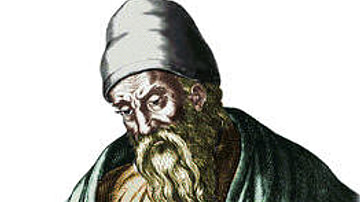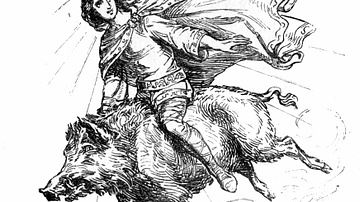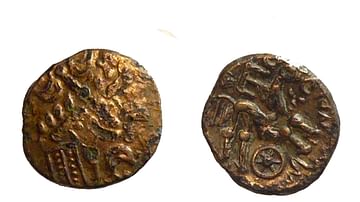Search
Search Results

Definition
Ludwig van Beethoven
Ludwig van Beethoven (1770-1827) was a German composer of Classical and Romantic music; he is widely regarded as one of the greatest musicians to have ever lived. Most famous for his nine symphonies, piano concertos, piano sonatas, and string...

Definition
Katharina Zell
Katharina Zell (also known as Katharina Schütz, Katharina Schütz-Zell, l. 1497-1562) was a reformer, theologian, and prolific writer in Strasbourg who helped establish the basic tenets of the Protestant Reformation without advancing sectarian...

Definition
Euclid
Euclid of Alexandria (lived c. 300 BCE) systematized ancient Greek and Near Eastern mathematics and geometry. He wrote The Elements, the most widely used mathematics and geometry textbook in history. Older books sometimes confuse him with...

Image
Freyr on his Boar
Drawing of the Norse god Freyr by Ludwig Pietsch, 1865 CE. According to the Prose Edda, Freyr received the boar Gullinbursti as a result of a contest between dwarves and their creation, instigated by Loki.

Image
Brennus Throws His Swords on the Scale
Vae victis! Woe to the vanquished! Brennus throws his sword on the scale after the sack of Rome in 390 BCE. Print by Ludwig Gottlieb Portman, based on the drawing of Jacobus Buys, 1794

Definition
Arminius
The Cherusci noble Arminius (c. 18 BCE - 19 CE) led the resistance to Roman conquest of Germania during the years 9-16 CE. Likely raised as a child hostage in Rome, Arminius gained command of a German auxiliary cohort in the Roman army. Posted...

Definition
Cimbri
The Cimbri were a tribe who lived in northern Jutland during the Roman era. Their ethnicity is enigmatic; scholars generally believe that the Cimbri were Germans, though others maintain that they were Celts. The late 2nd-century BCE migration...

Definition
Viriathus
Viriathus (c. 180-140 BCE) was the leader of the Lusitani in their war with Rome. In 150 Viriathus escaped the Roman massacre and enslavement of Lusitani who had surrendered peacefully. Viriathus continued to fight in the resistance and rose...

Definition
Commius
Commius was an Atrebates noble during Julius Caesar's Gallic Wars (58-50 BCE) who turned from Roman ally to indomitable foe. As king of the Atrebates, Commius ably served Caesar in Britannia and Gaul before becoming one of the main leaders...

Image
Ludwig van Beethoven by Stieler
An 1820 oil-on-canvas portrait by Joseph Karl Stieler of the German composer Ludwig van Beethoven (1770-1827). (Beethoven House, Bonn)